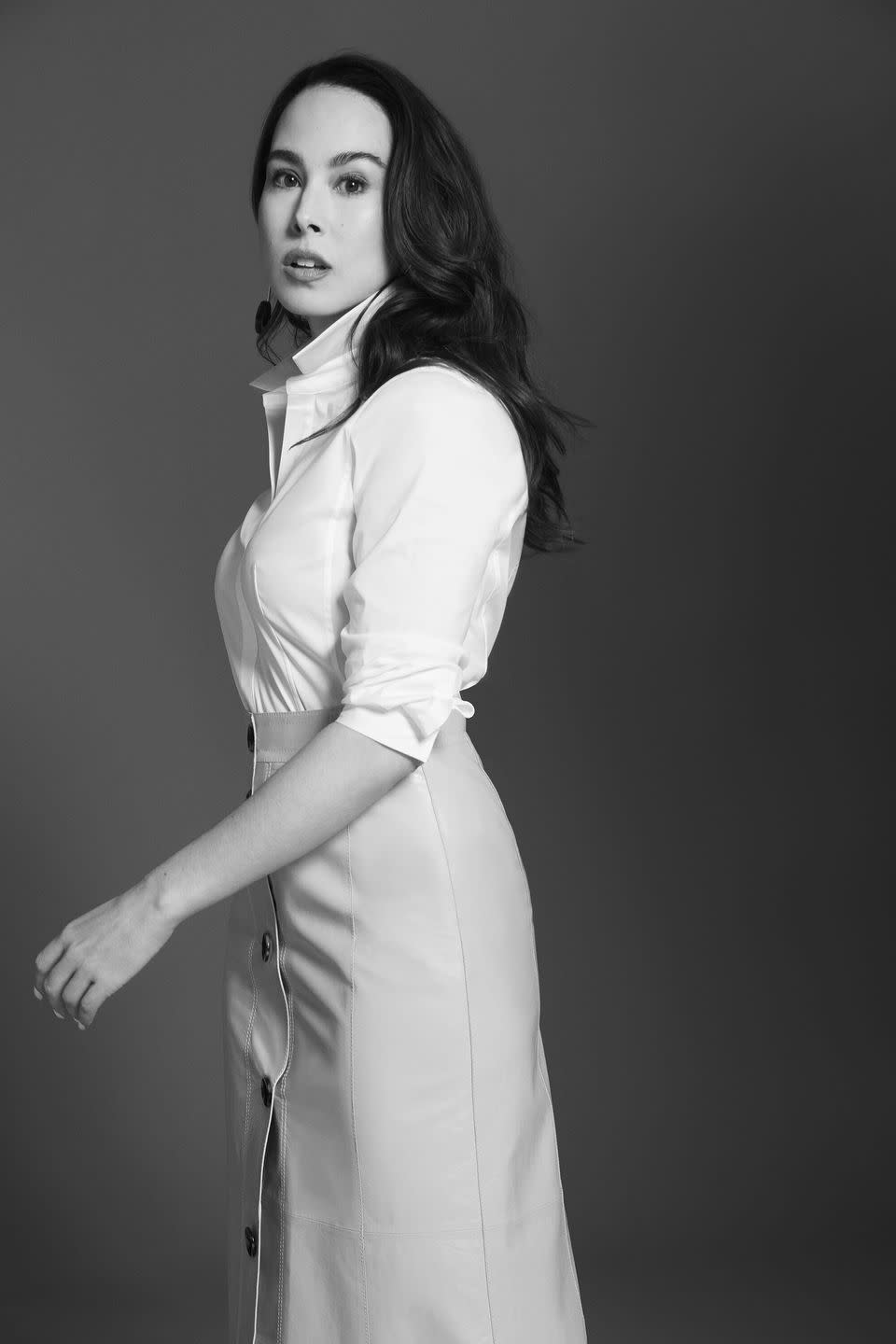For Meena Harris, Female Empowerment Is a Family Affair

When I call Meena Harris—entrepreneur, ex-Uber executive, attorney, author, and founder of the socially conscious brand Phenomenal—she immediately tells me she's exhausted … and excited.
It's the morning after the third night of the Democratic National Convention, where Harris's aunt, California senator Kamala Harris, officially accepted her nomination for vice president alongside Democratic presidential nominee Joe Biden, in what promises to be the highest-stakes election of our lifetime.
Since the start of Donald Trump's presidency in 2016, it's become increasingly apparent how divided America truly is. But rather than drown in the misery of the misogyny, racism, and sexism that pervades our nation, Harris has dedicated her career and platform to reminding women of their inner self-worth, value, and power to fight back.
Harris's Phenomenal brand consists of a line of minimalist T-shirts, sweatshirts, and cozy merch touting motivational phrases inspired by ongoing social justice movements, with all proceeds going to respective charities. It isn't a complex business plan—and it was never meant to be. If anything, Meena set out with a small but meaningful gesture: to allow women to simply feel seen, heard, and understood.
Though Harris experimented with one-off shirt designs before Phenomenal's official launch, the 2017 Women's March on Washington was the true kick-starter for her apparel. After multiple marchers wore her brand's namesake "Phenomenal Woman" tee, demand soared. Simple and matter-of-fact, it's a straightforward approach towards women's empowerment that Harris credits for the company's immediate popularity. A slew of famous faces who have posted themselves wearing the social media savvy merch on Instagram—including Kim Kardashian, Karlie Kloss, Tracee Ellis Ross, Lupita Nyong'o and more—have also helped promote the cause.
The Phenomenal brand is "political with a lowercase p in terms of women's equality," Harris tells BAZAAR.com. "It's universal and broad, and it has a huge, inclusive, diverse community under it. But I also think that it can be so personal. It's tangible, it's concrete."

She further explains that each product's charitable component, as well as the brand's intersectional approaches (think offshoots such as "Phenomenally Black," "Phenomenally Latinx," "Phenomenally Trans"), broaden Phenomenal's appeal to those who want to shop and support an important cause simultaneously. In recent years, the brand has also utilized its platform to align itself with pressing cultural moments, including taking out a full page ad in The New York Times to declare support for Dr. Christine Blasey Ford or collaborating with the organization Monumental Women to honor the first monument featuring Elizabeth Cady Stanton, Sojourner Truth, and Susan B. Anthony in New York's Central Park.
Can everyone mute please? Now available in the shop! Link in bio.
A post shared by Phenomenal (@phenomenal) on Aug 4, 2020 at 8:03am PDT
Harris' brand asserts that there's a kind of power in wearing your purpose. "I've been so inspired when people send us photos or messages where they took the shirt with them. I've heard people refer to it as their armor," she says. "People who say, 'I had a deadline, I had to pull an all-nighter, and I put on my fucking shirt and I jam through it.' Like, 'I'm phenomenal, I can do this.' And so it's this concept of it being so personal, and the ability to draw that confidence and self-affirmation out of it." Harris has experienced it herself. "The phenomenal mother merch—sometimes, I wear that hat when I feel like I'm being a really shitty mom," she says. "Because I need to remind myself, 'You know what? You're not going to always be able to get it right.'"
Growing up, women's empowerment was always core to Harris's family values. So threading the concept of uplifting women, and their work and value, into her brand was never a fad for her; it was the very notion on which she was raised.
"I would not be who I am, or have this perspective, or do what I do if it were not for my family, and in particular, being surrounded by these three strong, just incredible women, which were my grandmother, my mom, and my aunt," she says. "And in particular, my grandmother, she was the rock of our family."
"I mean, Kamala talks about her constantly," Harris continues. "We all do. I realized not only was my grandmother intending to basically teach me the same stuff that she taught my mom and aunt, but she was also doing it through contextualizing for me, what they were doing in the world at that time that I was seeing firsthand as a child, emphasizing their work ethic."
The lessons Meena Harris has learned from her mother, lawyer and public policy advocate Maya Harris, and her aunt has inspired her work and drive in more ways than one. Earlier this summer, Harris released her first children's book, titled Kamala and Maya's Big Idea, which paid homage to the life lessons she inherited from being raised in a female-centric family.
"I had a 17-year-old single mom," says Harris. "So I got to see her go to law school. I got to see her go through her first law firm job. And same [with] Kamala. I saw so much of my mother and my aunt, and them becoming powerful women in the world starting in their 20s. I had a front-row seat for all of it."
My #1 inspiration always. I love you, mom!!
A post shared by Meena Harris (@meena) on May 10, 2020 at 10:51am PDT
Now sharing the front row with her own two daughters, Harris says that teaching her girls to embrace the power their inner voices hold is a vital lesson she doesn't take lightly. Ultimately, her goal is to instill in them—and the thousands of other little girls who will read her book—the confidence they will need once they are older and introduced to the realities of misogyny and sexism.
"[Home] may be one of the only places, unfortunately, that [my daughters are] able to get that completely unfiltered information before they're out in society that tells them something totally different, which is, more often than not, to dim your light, diminish your accomplishments," Harris explains. "You become an adult, and then you have to fight for equality in the workplace or face discrimination."
Harris further elaborates that because of who her family is and where they came from—a family of Black and Indian women breaking into alarmingly gate-kept industries—it was important to understand and be prepared for what would no doubt be an uphill journey.
"Building up girls and their confidence and doing it as much as you can before you let them out into the real world, before they're kind of confronted with all of these other challenges and barriers—you're preparing them for that," she says. "My family never coddled me into thinking that my life was going to be rah-rah girl power. It was like, 'You're strong, you're powerful,' and building me up, but also conveying to me the reality, 'You're going to have to work twice as hard. Nothing's going to come without a fight. Nothing's going to be handed to you. Nothing's going to be easy.'"
A post shared by Meena Harris (@meena) on Dec 31, 2019 at 10:35am PST
That same mantra—of fighting for what one deserves, demanding change for an ultimately better world—is louder than ever as the country nears the 2020 election. Though many view this presidential race as a clear decision between the right or wrong future that could lie ahead, others—especially younger citizens—feel disillusioned by the civic act of voting. Especially since over the past four years, we've seen so much progress purposely scaled back. It's an overwhelming emotion that Harris recognizes.
"I understand the perspective to be disillusioned [with voting], and I hate it," she says. "I hate that we were in a place now where people feel that way. Voting would not be so important and so powerful and consequential if it weren't for the fact they're trying so hard to prevent us from voting. If it didn't matter so much, then they wouldn't be trying so hard to take it away from us...The stakes could not be higher."
Fundamentally, Harris wants voters this year to remember and acknowledge that there's no such thing as a perfect politician, but voting provides the perfect opportunity to hold our government officials accountable to build the future we want to see.
"It's not about electing people that are going to save us," Harris says. "It's about electing people who we're going to work with and demand the future that we want to see, that we want to live in, that we need for ourselves, for our families, for our communities."
You Might Also Like

